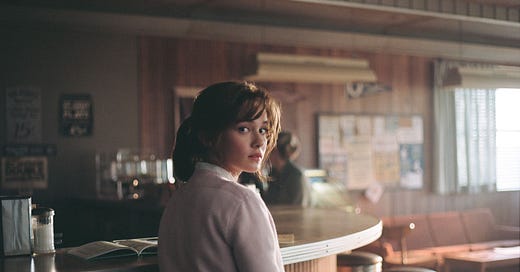The shattered fairytale romance of Priscilla Beaulieu and Elvis Presley becomes fodder for Sofia Coppola and her patient pearl-seeking eye in Priscilla (2023).
For Sofia fans, Priscilla presents as a foiled minor work, primly safe and simplistic, that confirms accusations of emptiness leveled by her detractors. The realm of American royalty and the 1960s backdrop, ripe in fashion and music, seems like ideal material for the filmmaker who deals in appearances, thoughtfully curated richness. Yet Priscilla falls entirely short, struggling to make impact beneath its artfully constructed atmosphere and delicately opulent imagery, of which there doesn’t seem to be enough. It’s another collection of vignettes and moods, a la Marie Antoinette but without the same impact. That anachronistic and political film harnessed beauty for survival. Indulgence, in the form of cakes, gowns, merriment, and leisure turned out to be an empowering and emancipatory force for the cooped-up queen. Coppola does nothing half as interesting with Priscilla.
Based on Priscilla Presley’s memoir, the film is a marginal Elvis biography and a more exhaustive biography of his child bride, capturing large swaths of the Priscilla’s life—from her initial meeting with Elvis as a 14-year-old army brat in Germany in 1959; to marrying him in 1963; and leaving him in 1972—and this broad plan of attack becomes a liability. As an excavation of a crumbling marriage it lacks severely, but as a portrait of young girlhood it’s rather affecting and clear-headed in its depiction of what is essentially grooming. Coppola is, as always, expertly and extraordinarily attuned to frequencies of adolescence, its attendant daydreams and longueurs, and that makes the best part of the film the initial third, where Priscilla is still a girl residing under her parents’ watchful eye.
Coppola film approaches Priscilla, young but not naive, and her feelings, with genuine care even as she confronts the couple’s age gap (Elvis was 24 when they met) with an impartial gaze. Spaeny is 5’1’’ to Elordi’s 6’5’,’ and their alarmingly conspicuous height differential becomes a visual manifestation of their emotional and psychological chasm. Spaeny and Elordi are the life force of the film, their performances mesmeric and quietly transformative, immersive but not excessive. In other words, they’re devoid of the grandiosity that marked Baz Luhrman’s Elvis. Spaeny convincingly registers as 14 and 27 and everything in between, transforming incrementally from wide-eyed teen to a dispirited young woman whose inner light has been dampened under the penumbra of Elordi’s suitably magnetic Elvis. Equipped with panty-dropping drawl, he projects an absolute charisma that veils crafty manipulation.
The film loses momentum when it relocates to Graceland, stranding Priscilla in a stunning palace cum prison and turning the tale of puppy love into that of kept woman. Going through his Vertigo-phase, Elvis prohibits Priscilla from wearing prints due to her stature. Spaeny is 5’1’’ to Elordi’s 6’5’,’ and their alarmingly conspicuous height differential becomes a visual manifestation of their emotional and psychological chasm.
Ultimately the cinematic grandeur of Priscilla (achieved on quite a budget) is at odds with the poverty of its themes, rendering the many excellent music cues (the 2001 cue is better earned and funnier here than it is in Barbie) and montages feel flat and perfunctory. The latter focused more on boyish frolics of Elvis and the Memphis Mafia, go-carting, setting off fireworks, roman-candling, than Priscilla. Her life is cloistered and stifled (she’s never having fun unless she’s with Elvis) but that doesn’t mean the film should be, too.





